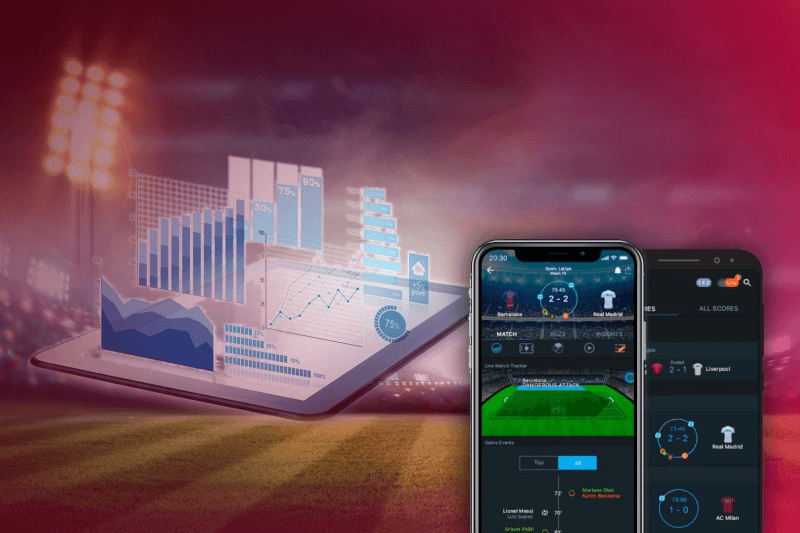
Data analytics in sports analytics can offer significant advantages for teams to have an integrated data-driven approach across all aspects of the business environment, from business strategy to operations and coaching staff. The ability to visualize data in real-time is a powerful tool for decision-making in sports analytics. Data analytics in sports and entertainment involves all kinds of data. From the team’s statistics that determine whether a player is on or off the pitch and from their mental models that define tactics to predict how well the team will perform.
Is it the solution to all the sports industry queries?
Data analytics in sports has been in popularity for quite some time now. Analytics has gained attention because analytics tools are available for any number of application areas, such as the following for football:
• Statistics – track players’ scoring, assists, goals, etc., in a game;
 • Financial – monitor the flow of money around the teams, the players, and even the stadiums;
• Financial – monitor the flow of money around the teams, the players, and even the stadiums;
• Video – track how players move around the field during a match;
• Goalkeeping – watch how a save is made;
• Tracking – track an attacker’s and defender’s movement throughout the game;
• Monitoring – monitor a defender entering a box and leaving a box.
The digital information collected by football is analyzed, translated, and used to create an analytical performance analysis with a predictive value.
Sports analytics and data services are a growing area that is important for understanding its needs concerning its marketing and fan engagement. The data analytics landscape is large, complex, and largely undiversified. Organizations have built their business and strategy around their data. Even in traditional business terms, companies still spend substantial amounts of money on implementing, acquiring, and integrating data analytics into their processes. To help identify the key areas where analytics is being deployed in the organization, many organizations have developed metrics that allow them to monitor their analytics work, which is typically designed to look for patterns within data or patterns in the performance of the business processes foundation of good analytics.
Data analytics in sports and its related applications in more general fields often is used to understand which players (players not necessarily playing sports) influence an organization’s success in an otherwise insignificant or worse-performing area. A model of the impact of sports on a business is often valuable for evaluating the relative importance of players and other factors. In a simple business context, it is usually helpful to quantify the impact or significance of a particular attribute using the percentage of money earned by an organization versus how much money it generates.
 Sports Analytics bring home Big Data Big Hacks.
Sports Analytics bring home Big Data Big Hacks.
Data analytics in sports and recreation has gone from being niche to mainstream over the past decade. As a result, teams are using this new model to increase the number of players, hours of play, and revenue streams they generate for sponsorships, licensing merchandise, and equipment. At the same time, teams are also learning to use predictive analytics to improve their performances by identifying, analyzing, and prioritizing data to understand better the performance of players, their team, and the overall strategy for the organization.
The strength of big data analytics lies in the ability to predict a problem and apply deep analytics to it. But despite the vast potential of big data, companies often ignore the value it creates. That is not to say data are not valuable, it is, and it has a big impact on how businesses operate. The value that big data in sports analytics generates is often confused with the cost of creating a data product, and the difference between the two is not as straightforward as you might like. A business can generate value from this information to keep customers and prospective clients happy.
Data Acquisition
Sports data API is the major development in sports data analytics that helps organizations find the true talent in the sports data warehouse. It is an integral part of an organization’s Data Science strategy and stats sports database that leverages the power of data to drive new thinking. The primary objective of the data warehouse is to store information. A sports data API aims at creating a Big Data solution so that it is the next-generation solution for the business. The focus of data analytics through APIs is to produce a Big Data solution that can solve problems with a higher level of effectiveness and accuracy, which includes the following:
• Making the right decisions based on the information in the data to improve outcomes
• Detecting and predicting the actions needed to achieve the desired objectives
• Understanding how business opportunities are created and how the organization can capitalize on those opportunities
• Analyzing data to improve decisions, manage budgets, improve product or service quality, and monitor progress
• Identifying problems and developing a strategy to address them
• Using Big Data analytical tools to create an accurate forecast of future events.
An API is an optimal solution to today’s sports data analytics. To put it simply, an API’s strengths include quick and powerful processing, storage, analysis tools for a wide variety of applications, versatility, and adaptability to the data and business needs. In addition, the new generation of Internet APIs provides data to answer users’ questions more easily. Data Sports Group is a sports API standing firm in the data Analytics field, owning excellent business tactics. In the near future, these APIs will provide plenty of insights and data to organizations on the sports data that helps to create actionable business decisions.










